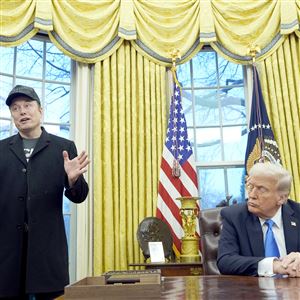
Dan Fitzpatrick, Post-Gazette
China is second only to the United States in its number of Internet users. The government monitors what the users, like those seen here at an Internet cafe in Shenzhen, see online.
BEIJING -- Among computer scientists and brainy college students in China, the bespectacled Kai-Fu Lee has rock star-like status.
Not only did the former Carnegie Mellon University student and professor receive $10 million to start Google's lab here, but at 44, he is a hot ticket on the lecture circuit, speaking to thousands of university students at a time, some willing to pay scalpers more than $50 for a seat.
His recent self-help book, "Be Your Personal Best," sold 700,000 copies, making it a No. 1 best seller. And more than 150,000 Web users regularly log on to his Web site, www.kaifulee.com, where he dishes up advice and philosophical musings like the one he posted after joining Google: "youth + freedom + bottom-up innovation + user focus + don't be evil = The Miracle of Google."
Aware of his celebrity, Mr. Lee is encouraging young Chinese to be free -- free to make the most of their lives, to be individuals, to think creatively, to pursue their passions and not just material gain.
To make "the right choices," he said, from his office here.
But freedom, as many former Pittsburghers here know, is still an elusive pursuit in China three decades after the death of Communist Chairman Mao Zedong. Young Chinese have many more opportunities for education and money-making than their parents and grandparents, most of whom suffered in one way or another during Mao's rule, a time of brutal political campaigns, famine and abuse.
And yet, this new generation is still limited in what it can say about its government, about working conditions, about wages, about the country's authoritarian state. The June 1989 crackdown in Tiananmen Square, which resulted in the deaths of hundreds if not thousands in the square and the nearby streets, snuffing out a democracy protest, was a chilling reminder of how far China will still go to maintain order. Even today, thousands of government censors are scouring the Internet for any sign of organized dissent.
It was not long ago that experts predicted the Internet would open Communist China to democratic free expression and that any attempt to bottle things up would be like nailing " Jell-O to the wall," as former President Bill Clinton put it. And while it's true that at least 105 million Chinese are now Web users, second only to the United States, and many are using the porous information tool to communicate in ways never thought possible -- through message boards, chat rooms, Weblogs, e-mail and instant messaging -- the Chinese government still is able to look over the shoulder of its citizens with an online monitoring force of 30,000 and the power to shut down Web gateways at any time.
There also are limitations to what can be discussed or shared online -- a lesson being learned by U.S. Internet companies and the prominent CMU graduates who work for them.
It was CMU computer science grad Qi Lu who helped set up a Chinese business strategy for Yahoo! Inc. and remains a senior vice president of engineering with the Sunnyvale, Calif., search engine giant, which in 1999 became the first U.S. Internet company to operate from a location inside China.
In 2002, Yahoo drew some criticism when it, along with other companies, agreed to censor certain topics that remain sensitive to the Chinese, such as the independence of Taiwan. But it drew much more intense media scrutiny last year when French press group Reporters Without Borders accused the company of cooperating with the Chinese police in its search for a Chinese man who allegedly used a Yahoo e-mail account to leak certain information out of the country. Yahoo later claimed the police did not reveal why it needed the information and that Yahoo simply complied with a court order. The man later received a 10-year prison sentence for distributing state secrets.
Microsoft received similar scrutiny last year for eliminating a politically sensitive site from its local blogging service at the request of the Chinese government and this year admitting that certain words, such as "freedom" and "democracy" had been eliminated from its Chinese MSN portal. Harry Shum, a 39-year-old CMU grad who runs Microsoft's Chinese research lab in Beijing, said he knows nothing about the blogging case.
But Mr. Shum acknowledged that censorship in China is a "complex issue" and that what to block from country to country is ultimately a "judgment call" based on local values and traditions. "Gradually," he said, the Chinese are enjoying "greater and greater freedom."
A child of China's Cultural Revolution who grew up poor, with "hardly ... anything to eat," Mr. Shum did his part for greater openness earlier this year when he accompanied Chinese President Hu Jintao to Redmond, Wash., for a meeting with Microsoft founder Bill Gates.
Mr. Shum was next to the two men when Mr. Hu, under pressure to eliminate software piracy in China, admitted to Mr. Gates that a Microsoft operating system is on his office computer in Beijing -- a surprising revelation. As Mr. Shum remembered it, Mr. Gates responded by saying, "If you have any questions about how to use Windows, I will be your personal assistant."
Even with Yahoo and Microsoft bending to the Chinese, it was Google's self-censorship policy that attracted the most scrutiny, especially in the United States.
In launching a Chinese engine called google.cn, the largest of all American search companies willingly blocked users from accessing information about the Falun Gong religious sect -- a group banned by the Chinese government -- and the 1989 massacre in Tiananmen Square, where protesters and others were gunned down by Chinese soldiers. Google still has an unfiltered, U.S.-maintained engine the Chinese can access at any time, although many politically sensitive queries have not made it through Google's servers in the past.
Asked to explain the decision to Congress last February, a Google executive admitted that self-censorship "runs counter to Google's most basic values" but that by respecting the restrictions imposed by Chinese law, Google can still make a "meaningful -- though imperfect -- contribution to the overall expansion of access to information in China."
Google made this decision not long after hiring Mr. Lee, the CMU grad, to run its operations in China. The policy put Mr. Lee, a hero to many young Chinese intellectuals, in a "hard" spot, said 38-year-old CMU computer science professor Hui Zhang, who knows Mr. Lee. What makes it difficult is that "he put himself in a position to be a moral figure, preaching to kids about the right thing."
It was not a dilemma, however, that Mr. Lee wanted to discuss during an interview here. He declined comment.
But Mr. Lee is already familiar with the historical constraints imposed by the Chinese Communist Party. His father, Tien-Min Li, was a legislator with the Kuomintang political party, rival to the Communists in a civil war that lasted for decades during the early part of the 20th century.
When the Communists, led by Mao, pushed the Kuomintang out of China in 1949, Mr. Lee's father fled to Taiwan. Had he stayed, he would have been executed. Mr. Lee's mother and her five children escaped in 1950, and Mr. Lee was born 11 years later, in Taipei.
It was the dream of his father, Mr. Lee said, to someday return to China, a wish he expressed even while dying. "That stayed in my mind," Mr. Lee said.
He made it to the United States at age 11. As a doctoral candidate and assistant professor at CMU, he wowed university colleagues in the late 1980s with his development of a groundbreaking speech-recognition software program and a system for playing the board game Othello.
The year he left CMU, in 1990, he visited China. The country's still-rampant poverty shocked him, as did the conditions of the schools he visited. He came back in 1998 to launch Microsoft's Chinese research lab, writing an influential in-house manifesto called "How To Make it In China," and his role as self-help guru to young Chinese began in 2000, when he published a letter to students in a daily newspaper, offering advice on career, success and integrity. His third book, "Walk Into The Future," is due out soon.
This generation of Chinese is "fortunate," he said, the first able to enjoy a "safe, peaceful life" and pursue a "decent education." He wants students raised in a rigid test-based educational system to think more as individuals, as Americans would. But what he does not want is for young Chinese to pursue a "fast career" driven only by a "certain degree of desire for material things."
As China speeds along economically, Mr. Lee's old school, CMU, is being asked to help the country train this next generation to compete against the rest of the world, and for the last few years university officials in Oakland have been toying with the idea of a campus here. The request is straight from the Chinese government, where many of the top leaders are engineers -- a CMU specialty.
CMU President Jared Cohon has discussed the idea with Chinese officials, and CMU would like to do it "if we can find out a viable way to do it," said Professor Zhang, who is involved in the planning. The thought of building a school there and training a new generation of students "is a huge opportunity."
But there are several concerns. One is cost. While the Chinese have offered to put up money for buildings, CMU still needs at least $100 million, as well as another $5 million to $10 million a year, and labs funded by technology companies. Mr. Zhang said he has talked to a Hong Kong billionaire about funding.
Another is size -- CMU is not sure it can offer a mass-market educational product to the largest nation in the world.
And then there is the issue of CMU's brand. Working with the still-restrictive communist government might place the school in a compromising position on certain topics.
"We are still thinking about it," Mr. Zhang said.
But are the young people of China really that upset about their perceived lack of freedom, as compared with the United States? The answer to that question is also elusive, 30 years after Mao's death.
Twenty-two-year-old student Shang Qiu Jue, walking under Mao's picture in Tiananmen Square, said she knows very little about what happened during the government's crackdown on democracy in June 1989 and that little about the event can be gleaned from her textbooks, which gloss over the event. She knows nothing, for example, about that picture of the lone Chinese man holding back a fleet of tanks, a photo flashed around the world.
While she "heard" that students were killed in the square, "we don't know why," she said.
But that lack of knowledge does not bother her, she said.
After all, the government, she believes, has little impact on her day-to-day existence.
The same view belongs to 24-year-old Xu Yan, who recalls working at a Beijing hotel that catered to tourists and having guests ask her what happened in 1989. Not knowing the answer, she had to consult Chinese newspapers, which claimed few died. When told that some believe at least 3,000 died, she looked surprised. "Really?" she said.
But Ms. Xu still believes she is free to say and write what she wants. Inside an Internet cafe near Beijing's Wangfujing shopping district, on a Friday night, she acknowledges the warnings on the walls about restricted Web sites and pornography, but claims she is free to say that "Hu Jintao (the Chinese president) is a bad person."
"We can write it."
Not that Ms. Xu is interested in that sort of thing.
Wearing a T-shirt that spells out the word "Fun," Ms. Xu is more interested in music -- she downloads an MP3 file of "Take me to your heart" by Chinese pop star Jacky Zheng -- and sending instant messages to her friend in Shenzhen, a city in southern China, discussing vacation plans and work.
She is aware that certain news is not readily available online, but argues that lots of nations suppress information. Searching for the perfect words to express this sentiment, she later finds a Chinese-English dictionary and points to a phrase, expressed in English:
"Don't wash your dirty linen in public."
Looking up, she said, "Every country is like this."
Ms. Xu is convinced that her country, her leaders, want "us to have a good life."



Carnegie Mellon University graduate Harry Shum is managing director of Microsoft Research Asia.
Click photo for larger image.

Carnegie Mellon University graduate Kai-Fu Lee runs Google's office in Beijing.
Click photo for larger image.
First Published: November 26, 2006, 5:00 a.m.













